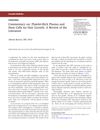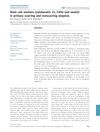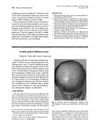 1 citations,
July 2022 in “Clinical dermatology review”
1 citations,
July 2022 in “Clinical dermatology review” Hair transplantation is an effective hair loss treatment with two main techniques, requires careful planning, and can improve beard and eyebrows appearance.
 3 citations,
July 2018 in “Journal of Oral and Maxillofacial Surgery”
3 citations,
July 2018 in “Journal of Oral and Maxillofacial Surgery” Hair loss can occur after oral surgery, likely due to stress and pressure on the scalp, and usually gets better on its own.
 September 2014 in “Hair transplant forum international”
September 2014 in “Hair transplant forum international” Galenic lotions can effectively treat different patterns of hair thinning in men and women.
 23 citations,
October 2005 in “Dermatologic Surgery”
23 citations,
October 2005 in “Dermatologic Surgery” Finasteride improves surrounding scalp hair and increases hair density after hair transplant.
 6 citations,
February 2020 in “Journal of The European Academy of Dermatology and Venereology”
6 citations,
February 2020 in “Journal of The European Academy of Dermatology and Venereology” No benefits found using platelet-rich plasma in hair transplants for male hair loss.
 August 2019 in “Aesthetic Surgery Journal”
August 2019 in “Aesthetic Surgery Journal” PRP can boost hair growth and thickness, especially in early stages of hair loss, but its effectiveness varies and there's no set method or treatment frequency. Stem cells also show promise for increasing hair density.
 3 citations,
December 2016 in “Blood”
3 citations,
December 2016 in “Blood” PRP treatment can increase hair growth in male pattern baldness, but this effect is not linked to the levels of growth factors or the number of platelets.
 September 2023 in “JEADV Clinical Practice”
September 2023 in “JEADV Clinical Practice” People with common hair loss conditions may have a higher risk of heart disease and related health issues.
April 2020 in “International journal of reproduction, contraception, obstetrics and gynecology” A postmenopausal woman with hair loss and hirsutism improved after surgery to remove an ovarian tumor.
 6 citations,
August 2009 in “Mini-reviews in Medicinal Chemistry”
6 citations,
August 2009 in “Mini-reviews in Medicinal Chemistry” Different drugs can treat high male hormone levels in women, but they have various effects and some may harm a fetus.
 370 citations,
September 1999 in “The New England Journal of Medicine”
370 citations,
September 1999 in “The New England Journal of Medicine” Finasteride and minoxidil are effective for hair loss, but continued research is needed for better treatments.
 May 2023 in “Scientific Reports”
May 2023 in “Scientific Reports” The seed extract of Lepidium sativum L. can potentially treat hair loss, showing effects similar to 5% minoxidil.
 24 citations,
November 1974 in “Scottish medical journal”
24 citations,
November 1974 in “Scottish medical journal” Diabetes often causes various skin problems and complications.
 9 citations,
November 2009 in “Journal of the European Academy of Dermatology and Venereology”
9 citations,
November 2009 in “Journal of the European Academy of Dermatology and Venereology” Cutting scalp biopsies in consecutive slices improves diagnosis of hair loss conditions.
1 citations,
August 2021 in “Cosmoderma” Low-dose oral minoxidil is effective and well-tolerated for treating hair loss.
 54 citations,
January 2009 in “British Journal of Dermatology”
54 citations,
January 2009 in “British Journal of Dermatology” Scarring alopecia affects different hair follicle stem cells than nonscarring alopecia, and the infundibular region could be a new treatment target.
1 citations,
March 2021 in “Frontiers in Medicine” Female pattern hair loss shows similar characteristics in both genders and should be classified by hair loss patterns, not gender.
 3 citations,
April 2022 in “Bioengineering”
3 citations,
April 2022 in “Bioengineering” Ultrasound can help deliver genes to cells to stimulate tissue regeneration and enhance hair growth, but more research is needed to perfect the method.
 196 citations,
June 2008 in “International Journal of Dermatology”
196 citations,
June 2008 in “International Journal of Dermatology” Dermoscopy helps diagnose and manage alopecia areata by showing specific hair changes.
 9 citations,
November 1993 in “Journal of The American Academy of Dermatology”
9 citations,
November 1993 in “Journal of The American Academy of Dermatology” Some men can have female pattern baldness without hormonal abnormalities or signs of feminization.
 5 citations,
November 2008 in “Advances in Dermatology”
5 citations,
November 2008 in “Advances in Dermatology” The review highlights the importance of stem cells in hair health and suggests new treatment strategies for hair loss conditions.
 17 citations,
January 1985 in “International Journal of Dermatology”
17 citations,
January 1985 in “International Journal of Dermatology” Minoxidil may help hair growth by stopping immune system attacks on hair follicles.

Hair loss can cause significant social and emotional issues, especially for women and young men.
 8 citations,
January 2016 in “European Journal of Plastic Surgery”
8 citations,
January 2016 in “European Journal of Plastic Surgery” PRGF treatment is safer and more effective for hair loss than topical minoxidil.
 7 citations,
January 1993 in “Rheumatology”
7 citations,
January 1993 in “Rheumatology” Most skin rashes in rheumatoid arthritis patients were not caused by their medication, and careful evaluation allowed most to keep taking their beneficial treatment.
 375 citations,
July 2006 in “Journal of Investigative Dermatology”
375 citations,
July 2006 in “Journal of Investigative Dermatology” Stress can worsen skin and hair conditions by affecting the skin's immune response and hormone levels.
 20 citations,
September 2005 in “Clinics in Dermatology”
20 citations,
September 2005 in “Clinics in Dermatology” Some skin problems can be signs of diabetes or other metabolic diseases and recognizing them can help diagnose and treat these diseases early.
 24 citations,
November 1992 in “Journal of the American Academy of Dermatology”
24 citations,
November 1992 in “Journal of the American Academy of Dermatology” Early diagnosis and aggressive treatment are crucial for better outcomes in lymphomatoid granulomatosis.
 24 citations,
February 1987 in “Drugs”
24 citations,
February 1987 in “Drugs” Minoxidil promotes hair regrowth, but more research needed for effectiveness and response factors.
 July 2012 in “Hair transplant forum international”
July 2012 in “Hair transplant forum international” Lifestyle choices like stress, smoking, heavy drinking, sun exposure, and chemical hair treatments might speed up hair loss in people with androgenetic alopecia.



























